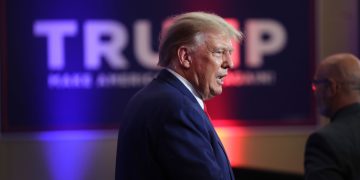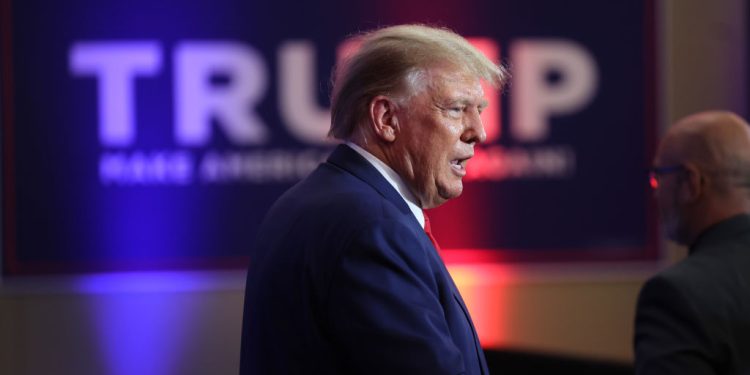Former President Donald Trump signaled that his next legal move may be to invoke his federal constitutional right against excessive fines as he faces a Monday deadline to turn over $464 million in the New York civil fraud case brought by Democrat state Attorney General Letitia James.
Last month, Judge Arthur F. Engoron fined the former president and presumptive Republican presidential nominee $355 million plus over $100 million in interest.
Engoron concluded that Trump’s company, The Trump Organization, inflated the value of its properties in order to get better loan terms.
Trump’s attorneys countered during the trial that all the loans from banks were paid on time, in full, so there were no victims. The banks actually made millions of dollars by loaning to his company.
On Monday, according to Fox News, Trump’s attorneys informed the court that given the massive fine, their client has been unable to secure a bond so he can appeal his case.
On Tuesday, Trump wrote in a post on the social media platform Truth Social, “Judge Engoron actually wants me to put up Hundreds of Millions of Dollars for the Right to Appeal his ridiculous decision. In other words, he is trying to take my Appellate Rights away from me.”
“I would be forced to mortgage or sell Great Assets, perhaps at Fire Sale prices, and if and when I win the Appeal, they would be gone,” he added.
Trump also posted articles referencing the Eighth Amendment as a recourse to prevent New York from imposing the large fine.
The Eighth Amendment states: “Excessive bail shall not be required, nor excessive fines imposed, nor cruel and unusual punishments inflicted.”
The 45th president posted an article from Fox quoting former federal prosecutor Andrew Cherkasky, who said, “I would not count Trump out yet.”
He pointed to the Eighth Amendment, noting that James has threatened to seize Trump properties like 40 Wall Street and Trump Tower, just off Central Park in Manhattan.
“[If] James actually does try to foreclose on some of his properties, I think he still has paths to move forward through federal court, ultimately to the Supreme Court to complain about Eighth Amendment violations,” Cherkasky said.
He added it seems “unbelievable” that the Constitution would permit such a move by a state.
“It does seem very unusual to have to essentially disgorge yourself of everything that you’re still fighting for through the appellate channel,” Cherkasky said.
Trump also posted a commentary piece from the Los Angeles Daily News titled, “Ruth Bader Ginsburg and Trump’s $355 million fine.”
In it, columnist Susan Shelley contends that a case Ginsburg wrote the majority opinion for in 2019 could help Trump.
The Supreme Court held 9-0 in the Timbs v. Indiana case that the Eighth Amendment is applicable to the states.
The justices ruled against Indiana for assessing a fine that was “grossly disproportionate” to the gravity of the offense. The state was seeking to confiscate defendant Tyson Timbs’ $42,000 Land Rover. The value was more than four times the maximum $10,000 fine that he was liable for in a criminal case that involved controlled substances and conspiracy to commit theft.
“The Eighth Amendment’s Excessive Fines Clause is an incorporated protection applicable to the States under the Fourteenth Amendment’s Due Process Clause,” the now-deceased Justice Ruth Bader Ginsburg wrote.
“The prohibition embodied in the Excessive Fines Clause carries forward protections found in sources from Magna Carta to the English Bill of Rights to state constitutions from the colonial era to the present day,” she wrote in the ruling. “Protection against excessive fines has been a constant shield throughout Anglo-American history for good reason: Such fines undermine other liberties.”
“They can be used, e.g., to retaliate against or chill the speech of political enemies,” Ginsburg observed.
Trump also posted a Wall Street Journal editorial that asserted that James’ $464 million bond requirement effectively denies him of due process.
“In order to appeal the judgment, Mr. Trump could have to unload property in a fire sale. If he were later to win on appeal, his lawyers rightly argue that he would have suffered an enormous, irreparable loss,” the editorial pointed out.
The Journal editorial board added: “As we wrote last month, the judgment is overkill. None of Mr. Trump’s business partners lost money lending to him or claimed to have been deceived by his erroneous financial statements. No witness during the trial said his alleged misrepresentations changed its loan terms or prices, and there was no evidence that he profited from his alleged deceptions.”
It concluded, “Whatever his transgressions, defendants are entitled to due process, which includes the right to appeal. Ms. James is trying to short-circuit the justice system to get Mr. Trump, as she promised she would during her 2018 campaign.”
This article appeared originally on The Western Journal.


























 Continue with Google
Continue with Google